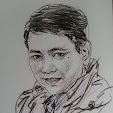Therefore, following the holy fathers, we all with one accord teach men to acknowledge one and the same Son, our Lord Jesus Christ, at once complete in Godhead and complete in manhood, truly God and truly man, consisting also of a reasonable soul and body; of one substance [
homoousious] with the Father as regards his Godhead, and at the same time of one substance with us as regards his manhood; like us in all respects, apart from sin; as regards his Godhead, begotten of the Father before the ages, but yet as regards his manhood begotten for us men and for our salvation, of Mary the Virgin, the God-bearer [
Theotokos] one and the same Christ, Son, Lord, Only-begotten, recognized IN TWO NATURES, WITHOUT CONFUSION, WITHOUT CHANGE, WITHOUT DIVISION, WITHOUT SEPARATION; the distinction of natures being in no way annulled by the union, but rather the characteristics of each nature being preserved and coming together to form one person
[prosopon] and subsistence [h
ypostasis], not as parted or separated into two persons [
prosopa], but one and the same Son and Only-begotten God the Word, Lord Jesus Christ; even as the prophets from earliest times spoke of him, and as our Lord Jesus Christ himself taught us, and the creed of the Fathers has delivered to us.
For an excellent reflection on the humanity of Jesus, read Elizabeth Johnson, "The Humanity of Jesus," in
Consider Jesus: Waves of Renewal in Christology (New York: Crossroad, 1991), 19-34. - availbe in the
FileBox.
